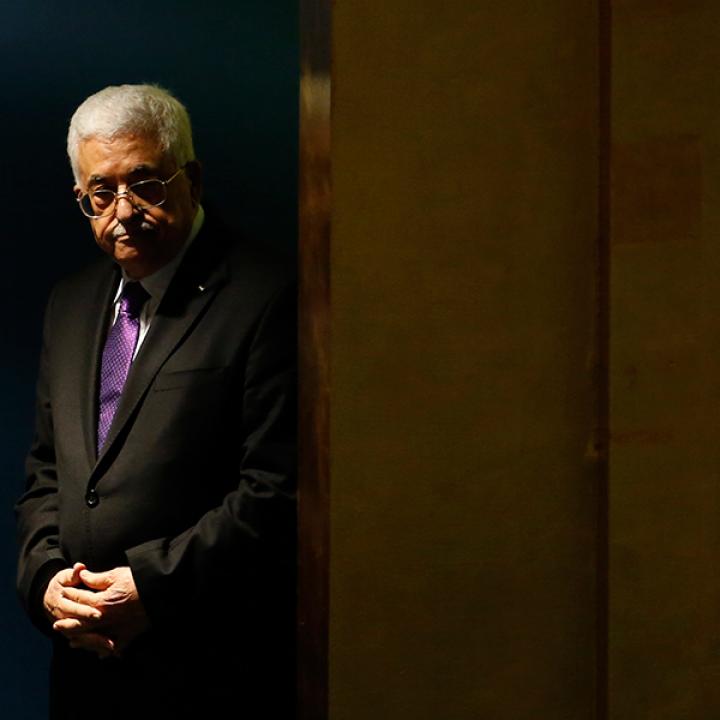
- Policy Analysis
- Policy Alert
Firing PA Governors: Precursor to Change or Internal Power Play?

Although Abbas’s latest edict might hold consequences for Fatah politics, the PA’s public standing, and West Bank militancy, a measure of skepticism about its significance is warranted.
In a surprise announcement earlier today, President Mahmoud Abbas fired the majority of the Palestinian Authority’s local governors, several of whom were reportedly unaware they were being sacked and learned of the decision through media sources. No replacements were appointed; instead, a presidential committee has been established to recommend suitable candidates to Abbas.
The PA is administratively divided into sixteen governorates: five in the Gaza Strip and eleven in the West Bank (including Jerusalem). The new edict removed all four of Gaza’s active governors (the fifth post has been vacant since the last governor died in 2020). In the West Bank, only the governors of Jerusalem, Ramallah, and Salfit remain.
According to Presidential Edict 22 (2003), a PA governor is considered “the president’s personal representative” and “the highest authority in his governorate,” with wide jurisdiction over civilian and security matters, including the power to preventively detain individuals. All matters relating to governors are managed by the president’s office, making holders of that position some of the most powerful officials in the PA bureaucracy. Most governors are also drawn from the senior ranks of Fatah and the security services, adding another layer of power to the post and making it a political as well as administrative position.
The new edict was issued in a context of growing West Bank instability due to increased friction with Israel and domestic discontent with the PA, leaving governors as frequent targets of public ire. For example, the Jenin governor’s office came under literal fire recently when the PA attempted to arrest militants following an Israeli military incursion. And in Hebron, the governor was criticized after PA forces killed activist Nizar Banat in 2021, and more recently for his failure to end armed clashes between clans.
Implications
At present, it is unclear what prompted the announcement, and the text of the edict does not provide a reasoning. Irrespective of its intent, however, the decision could have four notable effects.
First, PA officials will likely use the decision to assuage international diplomatic worries about their hold on power. For some time now, regional and international interlocutors have expressed deep concerns about poor governance and political stagnation in the PA.
The new vacancies and the protracted committee process for filling them will also create another arena of competition for senior Fatah officials, potentially distracting them from other responsibilities as they vie for the important positions. Given the primacy of personal loyalty in senior PA appointments, Abbas stands to benefit politically from this competition—though some of the ousted governors have established support among local Fatah activists, which could create tensions within the movement.
Less certain is the edict’s impact on public support for the PA, whose popularity has been steadily declining. One probable motivation behind the decision was to create a sense of change in the PA to counter its ossified image. Although it is too early to tell, such an approach is unlikely to have a lasting impact on the PA’s domestic standing absent more significant reform.
The edict might also be significant for the PA’s power in the northern West Bank, particularly Nablus and Jenin. In recent months, the governors of those districts had repeatedly clashed with newer militant groups such as the Lion’s Den and the Jenin Brigade; in the latter case, some of the confrontations resulted in violence. Will these groups see Abbas’s move as an olive branch or as a political and security vacuum to be exploited?
For now, the decision is shrouded in the PA’s typical ambiguity, making it difficult to precisely surmise the edict’s intent and potential impact. Abbas has a history of using dramatic domestic announcements to project a sense of motion without creating actual change (e.g., see his aborted election announcement of 2021). Thus, while the U.S. government should keep a close eye on how the edict affects Fatah high politics, the PA’s public standing, and West Bank militant groups, it may be premature to take a stance on the measure at the moment; indeed, some skepticism about its significance is warranted until events prove otherwise.
Ghaith al-Omari is a senior fellow at The Washington Institute and former advisor to the Palestinian Authority.



